Related Research Articles
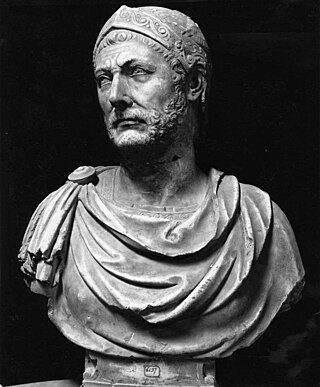
Hannibal was a Carthaginian general and statesman who commanded the forces of Carthage in their battle against the Roman Republic during the Second Punic War.

The Second Punic War was the second of three wars fought between Carthage and Rome, the two main powers of the western Mediterranean in the 3rd century BC. For 17 years the two states struggled for supremacy, primarily in Italy and Iberia, but also on the islands of Sicily and Sardinia and, towards the end of the war, in North Africa. After immense materiel and human losses on both sides, the Carthaginians were once again defeated. Macedonia, Syracuse and several Numidian kingdoms were drawn into the fighting, and Iberian and Gallic forces fought on both sides. There were three main military theatres during the war: Italy, where Hannibal defeated the Roman legions repeatedly, with occasional subsidiary campaigns in Sicily, Sardinia and Greece; Iberia, where Hasdrubal, a younger brother of Hannibal, defended the Carthaginian colonial cities with mixed success before moving into Italy; and Africa, where Rome finally won the war.
This article concerns the period 219 BC – 210 BC.

Year 217 BC was a year of the pre-Julian Roman calendar. At the time it was known as the Year of the Consulship of Geminus and Flaminius/Regulus. The denomination 217 BC for this year has been used since the early medieval period, when the Anno Domini calendar era became the prevalent method in Europe for naming years.

The gens Livia was an illustrious plebeian family at ancient Rome. The first of the Livii to obtain the consulship was Marcus Livius Denter in 302 BC, and from his time the Livii supplied the Republic with eight consuls, two censors, a dictator, and a master of the horse. Members of the gens were honoured with three triumphs. In the reign of Augustus, Livia Drusilla was Roman empress, and her son was the emperor Tiberius.

The Battle of Cannae was a key engagement of the Second Punic War between the Roman Republic and Carthage, fought on 2 August 216 BC near the ancient village of Cannae in Apulia, southeast Italy. The Carthaginians and their allies, led by Hannibal, surrounded and practically annihilated a larger Roman and Italian army under the consuls Lucius Aemilius Paullus and Gaius Terentius Varro. It is regarded as one of the greatest tactical feats in military history and one of the worst defeats in Roman history, and it cemented Hannibal's reputation as one of antiquity's greatest tacticians.

The Battle of Lake Trasimene was fought when a Carthaginian force under Hannibal Barca ambushed a Roman army commanded by Gaius Flaminius on 21 June 217 BC, during the Second Punic War. The battle took place on the north shore of Lake Trasimene, to the south of Cortona, and resulted in a heavy defeat for the Romans.
Quintus Baebius Tamphilus was a praetor of the Roman Republic who participated in negotiations with Hannibal attempting to forestall the Second Punic War.
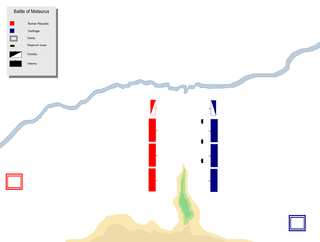
The Battle of the Metaurus was a pivotal battle in the Second Punic War between Rome and Carthage, fought in 207 BC near the Metauro River in Italy. The Carthaginians were led by Hasdrubal Barca, brother of Hannibal, who was to have brought siege equipment and reinforcements for Hannibal. The Roman armies were led by the consuls Marcus Livius, who was later nicknamed the Salinator, and Gaius Claudius Nero.
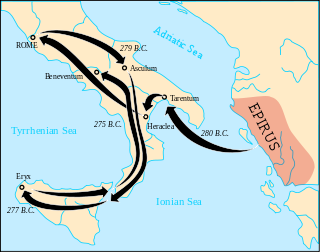
The Pyrrhic War was largely fought between the Roman Republic and Pyrrhus, the king of Epirus, who had been asked by the people of the Greek city of Tarentum in southern Italy to help them in their war against the Romans.
Maharbal was a Numidian army commander in charge of the cavalry under Hannibal and his second-in-command during the Second Punic War. Maharbal was a very close friend to Hannibal and admired him greatly. He was often critical to the battlefield success of Carthage over Rome. Throughout his Italian campaign Hannibal maintained numerical superiority in cavalry, and thus relied upon them and Maharbal to give his army an advantage.

Gaius Claudius Nero was a Roman general active during the Second Punic War against the invading Carthaginian force, led by Hannibal Barca. During a military career that began as legate in 214 BC, he was praetor in 212 BC, propraetor in 211 BC during the siege of Capua, before being sent to Spain that same year. He became consul in 207 BC.

The Battle of the Silarus was fought in 212 BC between Hannibal's army and a Roman force led by centurion Marcus Centenius Penula. The Carthaginians were victorious, destroying the entire Roman army and killing 15,000 Roman soldiers in the process.
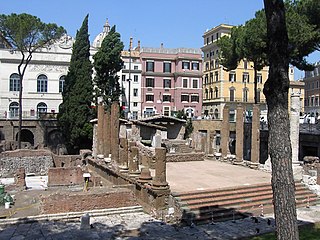
The gens Lutatia, occasionally written Luctatia, was a plebeian family of ancient Rome. The first of the gens to obtain the consulship was Gaius Lutatius Catulus in 242 BC, the final year of the First Punic War. Orosius mentions their burial place, the sepulchrum Lutatiorum, which lay beyond the Tiber.
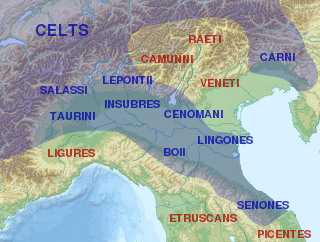
The Insubres or Insubri were an ancient Celtic population settled in Insubria, in what is now the Italian region of Lombardy. They were the founders of Mediolanum (Milan). Though completely Gaulish at the time of Roman conquest, they were the result of the fusion of pre-existing Ligurian and Celtic population with Gaulish tribes.
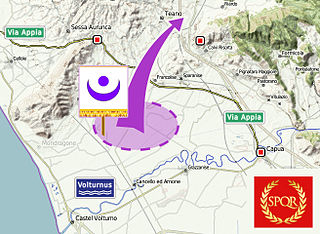
The Battle of Ager Falernus was a skirmish during the Second Punic War between the armies of Rome and Carthage. After winning the Battle of Lake Trasimene in Italy in 217 BC, the army commanded by Hannibal marched south and reached Campania. The Carthaginians ultimately moved into the district of Falernum, a fertile river valley surrounded by mountains.
The gens Centenia was a Roman family in the time of the Second Punic War. It is best known from two individuals, Gaius Centenius, propraetor in 217 B.C., whose cavalry force was defeated by Maharbal, and Marcus Centenius Penula, a veteran centurion distinguished for his bravery, who was granted a force to deal with Hannibal in Lucania, and was likewise defeated in 212.
Marcus Junius Silanus was one of the most successful Roman commanders in the Spanish theatre of the Second Punic War. He is best remembered for his defeat of Hanno and Mago in Celtiberia in 207 BC.
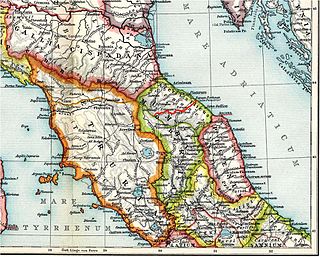
The Battle of Silva Litana was an ambush that took place in a forest 75 miles northwest of the Roman city of Ariminum during the Second Punic War in 216 BC. The Gallic Boii surprised and destroyed a Roman army under the consul-elect Lucius Postumius Albinus. Of 25,000 Romans, only 13 survived, with a few being taken prisoner by the Gauls. The corpse of Postumius was decapitated and his skull was made into a gilded ceremonial cup by the Boii. News of this military disaster probably reached Rome after the defeat at Cannae in the fall of 216 BC or the spring election of consuls for 215 BC, triggering a renewed panic. The Romans were compelled to postpone military operations against the Gauls until the conclusion of the Second Punic War, sending only two legions to guard against additional Gallic attacks. However, the Boii and Insubres did not attempt to exploit their victory. Cisalpine Gaul remained in relative peace until 207 BC, when Hasdrubal Barca arrived there with his army from Spain.